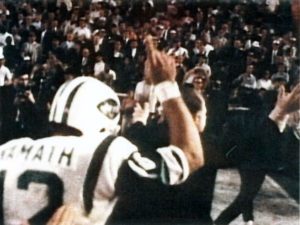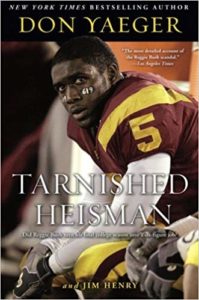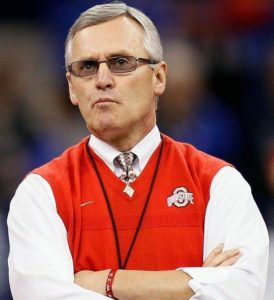The following article is pure puffery. The intention is to deal with a topic thoughtfully but not necessarily thoroughly; further, a fact or two may be more than a bit bent. Read critically . . . and enjoy!
CFP: the Playoff should not be expanded
(and it need not exist at all)
There’s plenty of energy around the college football playoffs, how they should be configured, and who sh

ould be in them. Here’s a short essay that makes essentially three short points
- a playoff isn’t needed at all and never was
- the shape of a playoff doesn’t matter, but the shorter and smaller it is the better
- it doesn’t much matter who should be in playoffs.
The quest for national consensus reached critical mass in 1998 with the rollout of the Bowl Championship Series and the crowning of the Tennessee Volunteers as its first champion. Since there is plenty written about the failings and risks and history of the BCS, we won’t get into describing how the teams were decided other than to say polls and computers arrived at the top two playoff teams who then met to decide the championship. Before the BCS, any number of polls and agencies (and universities!) declared champions, and everyone got along great agreement was rare.

cogito, ergo sum
There’s an emotional need for (perceived) exactness and certainly that some people have, so shared or disputed championships have riled nearly everyone: fans, alumni, players, boosters, and alien visitors in low orbit. It’s worth noting that plenty of writers and services had, even after Korea, declared national champions before bowl season even started; it was not nationally agreed that post-season play meant anything whatsoever (except, maybe, it proved only that a train ran from Yale to Florida). Because of conference obligations by bowl, the arguably best two teams seldom met, and odd results from the various bowls that were played made reconciling results impossible, so almost no one invested much energy in the notion of a national champion. To some extent, though, oxen were gored, and partisans screamed their cases and their critiques, but generally college football was just thought to be a fun diversion. Meanwhile, three hundred some odd national championships were claimed by various schools to account for the 150 years the game had been played: there is no right or wrong to any of those.

I guarantee it !
My notion about the championship fervor is that it has been fueled by the Super Bowl. The AFL and NFL were not giant leagues: originally most teams in either met and played once every year in the few (dozen) games, so selecting a champion by record to go the Super Bowl at least demonstrated some logic. The leagues would eventually grow and merge, and their popularity would soar in the last half of the twentieth century to tacitly symbolize and codify how all sports should be managed and seasons decided. The consolidated NFL would go on to acquire mythic proportion, displacing baseball as the both the national past-time and triplet to apple pie and motherhood. Ever since, the pointlessness of its burgeoning playoff schedule has seldom been remarked; the month-long festival came to fairly-well supplant or at least necessarily supplement the traditional holidays. Essentially, NFL playoffs came to be as emotionally necessary as Christmas, and that mania has corrupted and dominated everything ever since.
With the B CS, the best teams, on the NFL model, met . . . usually. Somebody had to win that game, and to some extent everyone was satisfied with the single, national result. Except that many were not, and I would simply point out that the dissatisfied people under the BCS are exactly the same sort of people as were dissatisfied before the BCS. If your ox was gored before, you were mad; if your ox was gored under BCS, you were still mad. This is the clearest and easiest critique of the BCS (and of any playoff): it resolves and it changes precisely nothing about whom we believe is the national champion.
CS, the best teams, on the NFL model, met . . . usually. Somebody had to win that game, and to some extent everyone was satisfied with the single, national result. Except that many were not, and I would simply point out that the dissatisfied people under the BCS are exactly the same sort of people as were dissatisfied before the BCS. If your ox was gored before, you were mad; if your ox was gored under BCS, you were still mad. This is the clearest and easiest critique of the BCS (and of any playoff): it resolves and it changes precisely nothing about whom we believe is the national champion.
The biggest challenges to the credibility of the BCS years are three:
- Boise State seemed to repeatedly deliver perfect seasons in its humble conference but never earn much consideration for the finale.
- An undefeated Auburn team (2004?) with one of the best offensive backfields to ever play the game was not voted into the finale.
- USC and Ohio State won BCS championships while playing critical players who would later be ruled ineligible; indeed, both schools vacated considerable wins from that era. There is no universally satisfactory way to resolve the outcome of those seasons other than individual conjecture, which, of course, is how every season is, in the end, weighed in any regard, playoff or no.

The deepest concern has always been that deciding the top two teams has never been unanimous. For many, the one-game BCS finale could never be relied upon to make sure that an excellent, deserving third- or fourth-placed team might unfairly miss the big game. A longer, wider playoff would at least settle the question of polls, especially if a politburo of unassailable nobles could be convened to pick the four top teams without being corrupted by the influence of computers or polls or conference bias.
Thus was born the College Football Playoff system. Under the CFP, four teams play single elimination games in January to decide the previous year’s champion, and, generally, there has been a reduced tension about the outcome. But the logic for the four teams is not universally satisfactory and still raises a few questions.
Two four-seeds and a three- have made it into the CFP finale; both fours- won. This doesn’t solve or prove anything, though! Some are consoled that the champion, obviously the best team post hoc, survived being underrated (fourth!) to make it into the playoff and prove themselves: four teams works! But it might be that even more people are more certain now than ever that the playoff should be broadened: there well might be seven- and eight-seed teams that would win out if only they had the chance. Logic only tells us one thing: this argument never ends, no matter how many teams are added to the playoffs; someone will still argue the list, same as before, same as before there was a list.
Statist ics tells us something worse: more playoff games afford more chances for the best team to fail to make it to the finale. By whatever criteria one might agree that a team is the best at the end of the season, and, to the extent that doG on his throne in Heaven could make sure that team was selected by the CFP committee to play amongst the final, say, sixteen, the extra games give that “best team” a greater chance to stumble and fall out of the process. This theoretically best team might lose a low-scoring affair by a single point to a team that is then eliminated in the next round, thinly as well, and so on . . . leaving us eventually with a champion who narrowly backed into winning it all after having a demonstrably worse season, which even a child would criticize.
ics tells us something worse: more playoff games afford more chances for the best team to fail to make it to the finale. By whatever criteria one might agree that a team is the best at the end of the season, and, to the extent that doG on his throne in Heaven could make sure that team was selected by the CFP committee to play amongst the final, say, sixteen, the extra games give that “best team” a greater chance to stumble and fall out of the process. This theoretically best team might lose a low-scoring affair by a single point to a team that is then eliminated in the next round, thinly as well, and so on . . . leaving us eventually with a champion who narrowly backed into winning it all after having a demonstrably worse season, which even a child would criticize.
This high-lights another question of ranking teams: what does a win prove? A game is a sort of coin flip, but you need to imagine a coin, in the case of 2019 Clemson, that probably comes up heads 90% of the time. As UNC proved this year, one needs only a tiny fraction of luck to be the team that is in town when tails comes up; more to the point: UNC had the coin standing on edge until it finally fell heads (insert sad trombone sound here). Pointy balls bounce exceedingly odd, but nothing went wrong enough for Clemson that UNC could prevail . . . but more than a dash of luck was involved in the final outcome. We only get to flip the coin a dozen times: football is a brutal sport that can not be mounted more than once a week; there is only so much of this ammo you can take to this kind of range, but a decision must be made. Single elimination means every added playoff layer increases, not reduces, the likelihood of a dubious champion. Ergo, a shorter playoff is better.

The CFP’s committee picks four teams today; the criteria for the four are arguably arbitrary, and the selections are capricious. The ballots are secret, and there is essentially no way to quash concerns about the equity of the process and whether even the supposed criteria are respected. Season win-loss, conference championships, and strength-of-schedule are presumed to dominate considerations, but there is no system to say how the decisions were made much less how they should be made.
Other emotional criteria can never be resolved to the satisfaction of the losers. For example, what does it even mean to have the best team of the season? Is it to have been the best team on some weighted week-by-week basis? Is there a weighting of SoS over results that is unambiguously determinant? These questions have never been settled, with or without a playoff.

How does a season-ending injury to a critical player count: is his team diminished in the now because of who they are, or is some fudge factor needed to credit them for who they should be? Returning to that first BCS championship: Chris Weinke, one of the greatest college quarterbacks of all time, was injured and did not play; as close as the game ended, it is hard to imagine Florida State not winning had Weinke played; by extension, they were the best team at the end of the year . . up until the moment he was injured. . . but they lost the finale without him. On a related track: one notion that is fairly universal is the belief that a loss early in the season is, ceteris paribus, more forgivable than a later loss.
From these foregoing examples, one can see two things: it is impossible to agree on how to weigh schedule and injury impact on the one hand, but, on the other: the only thing most people agree on (forgiving an early loss) is silly on its face.

So where does all this leave us? Well, the process for determining the champion has never been solid, agreed, or rational. Further, there is no process or breadth of scale that will eliminate disputes at the end of the season even in the playoff is expanded. This leads us to conclude only one thing: there is no unemotional need for a playoff . . . of any size. Choose your champion at the end of the regular season by whatever criteria you prefer, and then watch the championship, however it might be configured, merely for the love of the game.

1st, bitches! ‘Bama is in trouble.
https://media.giphy.com/media/xTtG36wNsH7eU/giphy.gif
Hey, the can show what they’re made of this weekend against Western Carolina.
*siniggers*
It’s not that hard to calculate strength of schedule. If you play an FCS team, it should count as a loss.
The players should be armed and fights to the death. Even then I’m waiting for the finale.
Meh.
Needs moar topless cheerleaders.
Those are the slaves tossed to the victors.
Seconded.
Just use the other guy’s helmet to beat him into submission.
How many teams will maximize the television revenue without decreasing future interest?
Pimptastic, yet still sort of intriguing:
https://www.gunbroker.com/item/841084589
Maybe I’m drunk…?
They had me until the spike.
I’ve got my pimp gun planned out, unfortunately it’ll have to wait for a few other acquisitions first.
There are a whole lot of firearms on my list before I start buying stuff like that.
i wouldn’t be caught dead with that in my hands.
In a fit of brokeness, I sold my beautiful nickle model 36 with pearl stocks. I still wish I had it back, even though I doubled my money on it.
There is a place for a “barbecue gun”, but not a bbq shotgun.
Smith and Wesson snub nose .38 chief’s special.
The guy that bought it felt bad, said he hoped I found another almost as nice.
Were I to buy a bbq gun, it would be a 1911 with mammoth tooth grips.
Yeah, either a 1911 or a nice SAA. I have a mint condition USFA in 45 Colt that I could pimp out a bit more to fill that spot.
Well, I have a ’76 Colt SAA in .45 now, but it’s blue. My .44 mag is nickle, but it’s OG, not BBQ.
I had one of these, but it got stolen, and when the police found it and gave it back to me the thieves had tried to remove the serial number with an grinder… They failed to remove the serial number, but they sure made a mess of the gun. That was one of a handful I got back. But on the upside I got a victim’s eye view of our utterly broken justice system. My front door kicked in while I was at work, and they carried my safe out and pried it open in a vacant house too something like 30 guns. 28 separate days spent waiting to testify, one 30 minute time testifying, total time served by criminals one got 6 months, 1 got probation (the juvenile that was the only one I was called to testify against).
That’s fucked up. Being a victim of crime can sometimes be a good way to see cops for what they are. Sucks that you hadda do it, though.
The content of this comment is too painful for me to contemplate. I’ve had guns stolen and it just hurts to remember it.
I’m sorry Jarflax. That is a beautiful model.
Great stuff, Don. I’m not really a sports guy, but this was interesting.
Props on the “ceteris parabis”. I try to work a little Latin when I can, and that’s a good one I have neglected.
science and stats guys need that one a lot
Sed non sunt.
SJW delenda est!
Nice. I’ve always been a fan of the Tables used with Footbal/Soccer Leagues. Of course the seasons are longer and the leagues are smaller, but still it is good. And each league gets a champion. But thats a big part of the issue, the “Need” to find “The” best team in the country means you can only have one league at the top.
Anything that isn’t a Euro-style league where every team plays every other team twice to determine a champion seems off to me. Even ‘Murican soccer apes the other American sports with conferences and playoffs and shit. I know *why* they do it – mostly logistics and an attempt to draw fans – but it still sucks when “the best team” may not be the one that actually wins the playoffs.
As for college football… a complete mystery.
Yeah i was mostly thinking Euro-style. I don’t follow the MLS but it doesn’t surprise me that they don’t follow true to form.
They did for one year – maybe five years ago? But since then there are too many teams to do a classic league format. And three more are joining in the next two years – it will get even less so.
every team plays every other team twice
highly desirable, no doubt
Yeah. For example, the German top league only has 18 teams in a country smaller than Montana. It’s easy to make it work.
And people still deny it’s a gay sport?
Prediction? Boise State ends up at the Fiesta Bowl in Vegas. Aaaaagain.
Which I am okay since its mah team and I live there
the only thing most people agree on (forgiving an early loss) is silly on its face.
Silly on it’s face? I get why people think that way though. Its like a stock pick. People want to pick winners. You’d rather be with a team that is going up then one that is heading down. Also i’d ay a team at the End of the season is expected to be at it’s best rather than at the beginning of the season, and so why people are more lenient.
Sorry this dropped while NewWife are out to see a What’s My Line troupe. I’ll catch up later.
In other news, more PC Babies were triggered by the most recent South Park:
https://www.indiewire.com/2019/11/south-park-trans-transphobic-lgbt-1202190642/
Man is the new time zone impinging on my ability to snark.
“But the most offensive lines (and this is where trans people might want to stop reading) in the episode come from Garrison herself, when she becomes incensed that she can’t get her period or get pregnant. “This would mean I’m not really a woman. I’m just a guy with a mutilated penis,” Garrison says. “You made me into a freak.”
Truth hurts.
Clutches pearls. I don’t know if I can take it (faints.)
provoked an immediate and universal backlash
In other news nobody we know voted for
NixonTrump.Damn. Getting ratioed on your own site.
How about this, no regular season. We start out with every team, random seeding, single elimination. You win all the way through you are the champion, you lose you are done.
Like robot wars!
IMO it should go one of three ways.
1) minor tweak – go up to 8 teams, guarantee P5 conference champs and best G6/IND gets a bid, plus two at larges
2) nuke tradition – 12 conferences of 10 teams, 9 game regular season, 4 team conference playoffs, 16 team national playoffs with 12 autobids and 4 at larges. Optionally, If you don’t quite want to nuke tradition, the first 2 rounds of national playoffs acan be hosted by the better seed, and the post season can work as it does now once it gets down to 4 teams in the playoff (all the other teams get invited to bowls)
3)old system – the teams go to their conference’s bowls and no official national champ is crowned.
One aspect that I think is missing in your analysis is that bowl season is about conferences more than teams. Yes, the teams are playing one another, but theyre all pretty much known quantities at this point. The conferences are not, and bowl season is a limited, but valid barometer on the strengths of the conferences. The flaw of the playoff is that it doesn’t affirm this truth. It shouldn’t only be about finding the best team, it’s about pitting the best representatives of each conference against one another to see what happens. That’s why SEC packing was such a travesty both in the BCS and CFP eras.
IMO it should go one of three ways.
Only if you are a Heisman candidate, regular players only get 1 cheerleader.
SEC packing
Nothing wrong with anything you wrote there.
As to packing, it makes more sense to complain about the low academic standards of the SEC. If other conferences are actually better teams, winning would shut down the packing issue soon enough.
It’s all about the conferences. Each conference has determined a champion on the field. I don’t see why the first loser should get priority over the champion from another power conference. Eye test is stupid, “good loss” is stupid, “stacked conference” is stupid. Win your conference or GTFO. I like what cyto said below. 8 teams, all conference champs.
Good article! I like talking college football!
Someone submitted mom’s French bread and of course I found an error. If you do the oatmeal variation, please add the water to the scalded milk – add the water , then scald the milk and add it to the oatmeal and butter and sugar. It will work much better
I’ll update tomorrow.
This is not on you. Pretty sure that’s what I said when I first added the recipe. Thanks for doing this. If there’s any way I can help, let me know
I fully intend to make the eggnog this wee. Thanks for that
Yeah, didn’t get to comment on the thread but I was waiting for the eggnog recipe.
My batch entered the fridge on the 11th for imbibing with friends on T-Day Well except for the “samples” for quality control from time to time.
Pro playoff:
Every other college sport (hell, even lower divisions of football) has a national champion. Expand the field to 8, maybe following trshmnstr’s prescription to be inclusive (excuse me please for using that word in a positive sense). The biggest obstacle to this is meshing it with the bowl system, but there are ways to spread the money around from year to year, similar to how they do it now.
Having a committee is problematic, except you have to have some way of whittling it down. Including enough teams means you are less likely to not pick a team that is capable of winning it all. (I remember in my state when I was in high school, every team played in the postseason, down to an overall winner. That’s excessive.)
I do agree with the idea that having more playoff teams decreases the chance that the best team wins it all. Although there is merit to the idea that a good team should be consistently good, even against good teams.
OTOH, I don’t have a strong feeling either way.
OT whine:
After two full weeks of trying to get CenturyLink out to the house to hook up the internet I finally lost it in the customer support dude yesterday. Modem never showed up, installation was delayed twice, it took several different 800# calls and about 16 prompts to talk to said person I told to fuck off.
So now my only option is Comcast whom I swore up and down I’d never give a Nicole to again.
Huzzah for defacto utility, quasi monopolies.
Thanks autocorrect….you REALLY helped me out on that one ?
Who is Nicole and why did you feel you have the right to give her to Comcast?
Who knew that autocorrect would cause so Mary typos?
It would be nice if you could disable autocorrect and make it Stack.
Don’t. Just don’t.
I doubt whatever bot she’s running to detect mentions will pick it up unless the two names occur in succession.
??
This person predated my time at TOS…
Please do tell.
Mary Mary quite contrary
Said some things that were quite scary
She doxxed someone and we doxxed back
And found her name was Mary
§÷å©k
Lol, bravo Sir!
LOL
She was so crazy she had a blog bitching about everyone at TOS and how they were stalking her or something.
I fucking lost it with CentryLink. I was moving and up until then had liked the service so was going to take it but they didn’t offer good enough service. I said ok, let’s shut service off next week when i move. The next day i come home from work and my internet is off. I try restarting the router. Nothing works. I call CentryLink, they put me on hold for an hour. When i get a hold of someone they tell me my service has been canceled. I’m starting to get heated and tell them i need it back on cause i work from home and need the internet and i asked for it to shut off in a week not today. “I wouldn’t advise doing that”. Yeah well it’s what happened and the fuck i asked fucked up. So i say what can we do to get it turned on. Their Reply “Unfortunately the team that could fix this left an hour ago, we will have to schedule someone to come out and fix it, but they can’t be out till next week”. That’s when i lost it. I told the kid how fucking retarded he is if he can’t understand that i’m fucking moving in a week and that signing a nother g-damned contract makes absolutely no sense in the world when my intentions are to stop using CentryLink in 7 days.
I will never ever ever go back. They have the absolute worst service ever.
Holy shit, what kind of fly-by-night operation are they running?? I bitch about
Time WarnerCharter but it’s nothing that bad.The labrynth you have to go through in order to talk to an actual person is insane…..and just when you think you are getting somewhere the voice recording tells you to call back during business hours……this was at 3pm.
I see you have never had Cox.
Never an issue with Cox for me. Maybe I am the lucky one.
I have and Comcast is worse.
Wow, that was really close. I almost asked you if your comment was directed at Rhy…
?
It was a joke, son. A joke!
/best Foghorn Leghorn voice
???
Some people prefer cunte.
I had Comcast, but was moving and after multiple calls decided it wasn’t worth it. They didn’t care. I bought a house and waited until I could get Verizon before getting internet. Worth it
We liked Time Warner.
Then it turned into Spectrum Cable.
My husband is so impressed with them, he calls them Rectum Cable.
My college’s paper was called The Spectrum. Guess what students called it.
The Rectum, or The Speculum?
The Rectum.
The admin paper is The
ReporterDistorter.I had WOW in Columbus. They were actually great. Comcast and Verizon suck, but Verizon sucks slightly less.
WOW is fantastic. It needs to be everywhere. Now, I might be biased because the first year I had WOW we were paying our landlord for it (and he used his discount to get us 60 Mbps in 2006 with HD cable for $70/month), since he worked for WOW as a field technician, and the one time we had an outage he came to fix his two rentals lines first.
PS. I’ve found that Spectrum has improved on Time Warner in pretty much every way. Kind of surprising to me but I’ll admit it. ??
I am not doubting your lived experience, but…how?
Better customer service and fewer outages.
*knock on wood*
Huh, must be a wash, because Charter has gotten shittier since they joined with Time Warner to create Spectrum.
Yeah, I think so too. Not a lot and it’s still too expensive, but they’re better than they used to be. We had to call yesterday because something was wrong with the box, and short hold and then a real person talked my husband through seeing if they could fix it from their end and when that didn’t work, made an appointment to have the guy out to fix it this morning 9-10 am. And he came in that window and fixed it. Before, that window would’ve been 4 hours and a few days later.
Also, when we moved the fuckers killed my email and tried to tell me it was gone forever, but one of the girls in the local office called their Rapid Response Team (whatever it’s called) and they got it back for me. Now, ideally,they wouldn’t have killed it in the first place, of course, but at least the local customer service person was able to deal with it.
true dat
I’m definitely open to alternatives. Fios is still not available here last I checked despite those mooks installing a box on the sidewalk in front of my building and fiddling with it as recently as a couple weeks ago. There’s no other broadband here.
You people spend 6 months on HughesNet and get back to me about how bad you have it now.
HughsNet is my only other choice besides DSL, but data caps won’t work for me, some of the stuff I have to do for work would hit the cap on one thing, but it would be faster.
You’re on early tonight Don. Who did you bribe?
Yeah, that’s twice: slow news nights? At least this screed had a smidge of history, stats, and logic to it instead of my usual if-I-were-king football opinions.
Isn’t it Congress who are supposed to decide college foozball playoffs, since no one else is smart enough to decide whose team is suppose to win? I mean sort of like the model for everything else should be if we ever want to get utopia?
I would trust them with college football if it’d get their hungry fucking eyes off healthcare.
And leave 1/6 of the economy unregulated?!?
In reality healthcare should probably be 1/10 or less, if it was left to a free market.
Do you want women, children and old people dying in the streets?
Only the ones of color! (I meant clowns! Really I did! They’re so damn colorful! It’s scary!)
Surely you mean more women, children and old people dying in the streets. I learned that in The Guardian.
A diverse/sustainable/LGBQWERTY friendly/carbon neutral/free for everyone college football championship series is a human right!
How are those pants not QWERTY friendly? Even nominally straight guys are getting “inspired” by those pants.
https://www.youtube.com/watch?v=9cDL7yc3W1c
Deep state, dude: Bureau of Gridiron Affairs
I thought Obama fixed it.
Guess what? Tomorrow is the 56th anniversary of John Wilkes Booth killing Caesar at Waterloo, fun fact.
Hahahahahaha! Conspiracy theory thread. Very fun.
All while John Kennedy took pictures his brother posing on a canal…
6 10-team conferences. Everybody plays everybody in the conference every year. 2 Nonconference games. Best record in the conference (NFL has tiebreakers for the complicated scenarios) gets an auto berth. 2 at large spots designated by committee, seeds for round of 8 are by committee. Location of round 1 is home field of the high seed. Bowl Game the round of 4, championship moves around like the Superbowl or NCAA Men B-Ball.
No bitching. You want in, win your fucking conference or spin the goddamn wheel. Don’t have a conference? Sleep tight thinking about that sweet, sweet TV deal money.
Thot Thursday wins the playoffs by a mile.
http://archive.li/syUHZ
I didn’t make it past 1. Gotta work on my stamina after being out of practice.
Thought you’d died of auto-erotic-asphyxiation!
I choke bitches, not myself.
A gentleman and scholar.
welcome back!
Thank you. I’ve mostly been on the discord thanks to work firewalls. I may have a way around that soon though. I have missed the place.
Also, good post.
I wouldn’t discount the success of the NCAA Men’s Basketball Tournament in part of the drive to have a college football version and then expand it.
Frankly, I wish they’d go back to 16 teams, but the driver isn’t competition. It’s the TV dollar.
tournaments make sense for all sports you can play several times a week
17.
Wow. What a great collection.
Man, look at that little cocksucker go.
LOL questionable! tenuous!
I would just like to have it entered into the official record that I finished the acrostic.
That is all.
The Aristocrats?
Without checking IMDB, didn’t someone make an entire film that was essentially various comics telling that joke?
Yeah, I think Penn and Teller were producers on it.
It’s 2-ish hours of the most delightfully cringe comedy you can possibly hear. My favorite bit is Doug Stanhope.
I hope that boy never sees the movie.
I hope he was born deaf.
Meh, kids don’t know what you’re saying to them. Otherwise all the times I read the Constitution as a bedtime story would be showing dividends by now.
Well, I’m off to bed. Thanks to both of you for the pleasant dreams I’ll have!
*wink*
Favorite comment: “Still a better love story than Twilight.”
And, it didn’t spawn fanfic that went on to become the 50 Shades franchise…So I’d say that’s another win over Twilight.
So, TLDR past this:
Except that baseball had established how playoffs work long before that.
That was just shorthand for the emotional takeover of the NFL, not any notion of them as the actual high example.
I’m a baseball guy first and foremost: carded out about 150 games a year for the past four years. Baseball had it right: win the pennant, go directly to the World Series. In baseball as in football, I maintain a shorter playoff schedule (fewer tiers) is more fair to the better teams, but they’ve left that logic behind.
ugh: the NFL’s takeover of most things American . . . that’s what I’m trying to imply
Ah, I gotcha, and don’t disagree. Baseball fucked it up in favor of TV ratings.
And the NBA and NHL have taken it even a couple steps past insanity. Their playoff seasons seem to be just about as long as the regular seasons.
talk about men against boys. He was like 27 playing against 17 year olds. He was past his NFL prime by the time he even graduated.
https://archive.li/Ckl5K/40b255a2b1bd46367ec935bec563f78584cffe8b.jpg
NSFW.
https://archive.li/rA0Us/6b87e0deaadeef840966d7f169115c7540a5b4de.jpg
NSFW.
https://archive.li/NNDdn/e397796554c7475c4f46d3dcde3f7903c5b4dae4.jpg
NSFW.
Do I get some sort of reparations for Brett using “my” avatar as the front-page pic for his afternoon links today?
Avatar appropriation.
It’s disgusting.
Did you draw that? If so, you don’t need to take the sketch challenge. It’s perfect.
Um…would you believe; yes?
The first ever Patreon supported cartoon was last year’s Thanksgiving Special. Many thanks for a glorious year on Patreon!
How about..you know…a new fix?
I was recording Trump audio today before work. Got the next two days off. If the overlords permit, there will be a new Thanksgiving Special next week.
Yes!!!!
I wanted to do a bonus episode this month, but a death in the family impinged on that, but that idea is getting rolled into the Thanksgiving episode, so it might end up being the longest yet, but until I have it all together I can’t promise that.
Ah shit. I missed that. So sorry, man.
It was my uncle that I’ve spent the last 4 years taking care of, but he would have turned 90 this month, so that was easier to handle than when my dad died at 59 when I was caring for him. It just makes me more grateful for you bastards; both your friendship and your money, that allow me to be flexible in my work to do care for family like I do and let off steam as I need. HAT VOICE: You are the betht fucking guyth!
One of my images was stolen as well
but of course I had stolen it myself in the first place
…as is the tradition.
Trying to fix college football is like trying to fix the election process: good effin’ luck. Corruption has managed to find an equilibrium and eliminating it it one area means giving more influence to corruption in another area.
College football is fixed. *UNLV Alum*
Sadly yes.
/Option #3
Me gusta mucho de música instrumental.
https://m.youtube.com/watch?v=XutKfAL7wx8
For those botching about their internet service from various providers upthread, from inside the bowels of the beast, I’m sorry. I don’t think it’s going to get any better when things go wrong. Best case is things don’t go wrong to begin with. The root cause is there’s not much money to be made in broadband, particularly consumer broadband. Even less to be made in broadband with good service. And the profitability is shrinking.
Heh.
https://dailycaller.com/2019/11/21/elizabeth-warren-charter-school-protesters/
I wish them luck but the Dems know who’s buttering their bread and it’s not parents who care about their kids’ education.
Too bad for Warren that school funding is a local matter, not a Fede…
*checks notes*
Nevermind.
Thanks again my friends, we are getting a motel for the weekend ,mostly so we can bathe my dear wife, it’s very difficulr
I’m sitting next to Bella and my kittah good times they love Dadoo,
I wish U were sleeping with my Wife,
But things are looking up, maybe big time
Or me sleeping with my wife
Good to hear that things are improving. Didn’t you have a GoFundMe or something going on where Glibs could chip in?
Right here:
https://www.paypal.me/yusefthehomeless
Great writeup! I really enjoyed it!
And you are completely wrong, all the way ’round.
If you win it on the field, you are not a dubious champion. Nobody questions the NCAA Basketball championship. Run that gauntlet, you are the champ. Case closed. Soccer, volleyball, baseball, softball, swimming, tennis, track….. they all name their champions on the field. And nobody complains.
Football is the only outlier. Because winning isn’t everything. It isn’t even the most important thing. Having the name is really high up there. And the proper press coverage. And possibly the right tie-ins with the right networks…
Way back in 1990, Georgia Tech split the mythical national title. Despite being undefeated and crushing Nebraska 45-21 in the Citrus Bowl, the AP decided to award the title to a Colorado team who’s one defeat came at the hands of those same Nebraska Cornhuskers.
The push was on in earnest after that.
The BCS proved to be the “put two name teams here, preferably one or two SEC teams” championship. That was improved by the move to 4 teams, but as this year’s debate proved, it is still entirely dominated by behind-the-scenes politics. UCF’s win over Auburn clearly demonstrated that the system is broken.
The only way to settle championships is on the field. And the only way to do that is if everyone has the same chance.
So I say 8 teams, Champions Only.
Win your conference championship in a P5 conference, you are in. Even if you have 3 losses. Win in one of the G5 conferences and you have a chance – just make sure the rest of the resume looks good.
Didn’t win your conference? Pound sand. This includes you, Notre Dame. No more free rides. Sorry NBC.
This fixes all of the problems of the college football championship system. It fixes running up the score. It fixes scheduling cupcakes out of conference (Alabama). All of it. It even fixes the Boise State, UCF problem. Go undefeated in a decent conference and you’re probably gonna be one of the 3 taken. Then you can prove it on the field.
No more “which 2 of these 4 SEC teams are going to make the playoff” debates with “I think they should take 3 SEC teams” as the rebuttal.
Just like basketball pre-expansion of the tournament… champions only. Everything decided on the field, no opinions involved. Just like God intended.
Colorado beat Nebraska…barely. They lost to Illinois and tied Tennessee and never broke the plane on 5th down vs Mizzou.
We tied UNC and thumped Nebraska ( I was there).
dang! 30 year old memories are weak!
And taking Colorado over an undefeated Ga Tech that played a really tough schedule is still a joke to this day. The AP should be embarrassed.
And if you have to turn to judges to see who won, you don’t have a sport. You have an activity. I’m looking at you, gymnastics. And skating. And diving. And college football – albeit to a much lesser extent with the advent of the 4 team playoff. Still, you need a champs-only rule or it will remain broken.
Great writeup! I really enjoyed it! And you are completely wrong, all the way ’round.
Every Glib comment should start this way.
Don’t tell me what to do.
and very Glib thread should end this way
8 teams, Champions Only
I don’t object. It’s not better, but if it makes you happy okay.
a/ The same guys who can’t be trusted to vote in the champion can be trusted to seed the top teams 1 through 8 ?
b/ This isn’t that hard on the 1 seed: he plays the 8, an arguably easy draw. An extra, meaningless but harmless game: I don’t object.
c/ But the 4 seed takes it in the shorts. Now they’ve got a very serious extra tilt, the toughest draw, the 5 seed, that they would not see today.
d/ Cupcake games continue. A team does what it must, the minimum, to win its conference, and no meaningful out-of-conference game need ever be played again.
e/ Fucks Notre Dame. I like it.
So we would add a mild challenge to the 1 seed for the benefit of nicking up the 4 seed because we don’t believe that the 1 through 4 seeds are well-chosen or properly seeded?
So I can safely assume I have the thread to myself…
College football sucks so there.
I don’t follow college football closely, but I find it a pleasant thing to watch on an autumn Saturday afternoon and/or evening. (As I’ve said ofttimes before, muscular young men in tight pants…) Friday night is for high school football, Saturday is for college, and Sunday (and Monday night) for pro football.
To be honest, I have NEVER had any interest in team sports. I was roped into playing lacrosse while in the Army but my tatstes tend towards the more solitary sports. I went to see the Tampa Bay Buccaneers play back in ’88 or ’89; Vinny Testaverde threw 3 interceptions to the Minnesoda Vikings before Halftime, so we left the game and went to a very busy, local TGI Fridays (American chain restaurant) where the staff was too busy to card the high-schoolers drinking at a table near the bar and watched the remainder of the game on television. In college, I didn’t pay attention to football apart from going to home games because both FAMU and FSU games are fun. Ditto tailgating for Saints games in New Orleans.
Oh, man! That’s gotta be like Mardi Gras in autumn! Who cares about the game?
I will happily spend the time tailgating under the overpass rather than set foot in the Superdome. Better food, better beer, at much better prices.
Not anymore.
Good day to you, Pie!
g’day
Yeah! What GT said.
Also, good morning to the both of y’all.
Mornin’ l0!
https://www.wfmz.com/news/area/pennsylvania/ag-charged-with-record-tampering-in-general-election-in-northampton/article_c012a106-0cbf-11ea-ba6c-abbf750f3259.html
Fucking Libertarians…
?
OMG! That might have affected the outcome of the election! I demand a do-over!
Also, mornin’ Sean!
Good morning. ?
Voter fraud never happens, who would do something that never happens?
Never trust someone riding a stolen adult tricycle.
https://philadelphia.cbslocal.com/2019/11/21/police-manhunt-miguel-angel-villegas-custody-shooting-officers-ocean-county/
https://www.shirtpunch.com/ok-boomer-ugly-christmas-sweater
https://www.shirtpunch.com/ok-zoomer-ugly-christmas-sweater
?
Who wears sweaters?
*raises hand*
I like 1/4 zip sweaters in the winter time.
But they don’t work. You always end up at an uncomfortable temperature and have to keep taking it off and putting it back on. Before long you’ve built up more static charge than a tesla coil.
I don’t have that problem. ?
Then either you’re exothermic, or too conductive. We’ll have to run tests to find out.
I have a lab in my castle in the Carpathians
Exothermic. No tests needed. Plus, I’m not falling for the old “we need to attach these electrodes to your nuts” again.
10 conference champs get autobids. 6 at large. 16 team playoff, first 2 rounds on campus at better seed played 2nd and 3rd Saturday in December. Semis on New Years Day, not NYE. Finals one week later.
The 1-16 game would be as exciting as in the basketball tourney, which means uva would eventually lose it.
Right now, based on robc ratings, that 1-16 game would be OSU vs Miami, OH.
::sings loudly & lustily:: “Lo-o-o-ove and honor to Mia-a-a-ami-i-i-i…”
If that game happened, we would all be Redskins…hawks…potatoes? That day.
I think 8 teams is a good number. Why? Because if you look back over the last decade or so, at the end of the season (including conference championships) there are around 8 teams left with 0 or 1 loss. This seems to me a reasonable cutoff for teams to have a decent shot at winning out. I don’t have strong opinions about the selection process.
Chris Weinke, one of the greatest college quarterbacks of all time,
Go home Don, you’re drunk.
Seriously, though, playoffs are about a lot of things, and determining “the best” (assuming there actually is some sort of complete ordering here) is not necessarily at or even near the top. Big time college sports is an entertainment business, and playoff games are foremost about selling tickets and TV rights and making more money for everyone*. Playoffs will increase until a market equilibrium is reached.
*Well, almost everyone.